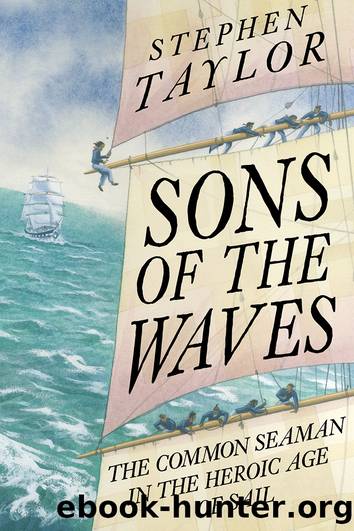Sons of the Waves by Stephen Taylor

Author:Stephen Taylor
Language: eng
Format: epub
ISBN: 9780300245714
Publisher: Yale University Press
As the two admirals involved at Spithead, both Howe and Bridport were subsequently blamed by a conscientious officer, Captain Cuthbert Collingwood, for what he called ‘this great national calamity’.6 But the First Lord at the Admiralty, Lord Spencer, also ignored loud-ringing alarm bells. Spencer had, in fact, been warned the previous December of rising bitterness over pay by Captain Thomas Pakenham, negotiator during the Culloden mutiny and an officer well connected with hands across the fleet.7 Pakenham was not the only captain to sympathize with them, or to tell Spencer of their disgruntlement. At the time, Spencer, unwilling to challenge a parliament beset with financial stress, responded that there was simply no more money – or, as he put it: ‘In the present state of the country, it is not possible to enormously increase disbursements.’8
All this needs to be set within the context of a country in crisis. Bonaparte, dominant in Europe, had mustered an army across the Channel at Brest, poised to launch an invasion of the British Isles. The Navy’s supposedly impassable Wooden Walls stood in the way, reassuring citizens that their island bastion remained secure – until a French fleet appeared off south-west Ireland in January and, a month later, 1,500 French troops managed to land near Fishguard in Wales. Although that inept foray was swiftly dealt with, it precipitated a run on the banks and the Bank of England was forced to suspend cash payments.
Through March part of the Channel Fleet was off Brest, bottling up the French invasion force. It was only in April, on Bridport’s return to Spithead, that he, as the new commander, received the original eleven petitions forwarded by the Admiralty, along with three new ones. Not that he was animated to do anything about them. It is fair to add that exploring the origins of each petition would not have been simple: the Channel Fleet was a complex organism, with ships variously dispersed between those blockading Brest, those at Spithead, and others anchored at Plymouth and Torbay. But even the newspapers sensed trouble in the air. The Morning Post reported that when the fleet returned on 30 March, ‘a gloomy discontent pervaded every crew’; this had become the topic of conversation ‘in every public house in Portsmouth . . . and the most fatal predictions have been made’.9 Bridport remained blithely oblivious of the mood on his ships. In the lead-up to mutiny, it seemed the Channel Fleet did not have a commander-in-chief at all.10
All the more remarkable therefore was the collective strategy being coordinated by sailors dispersed around Portsmouth’s waters and beyond. Of the original eleven ships to sign the petition, just four were back at Spithead during the critical first week of April; the others remained at sea or were refitting. But hands on at least thirteen more ships of the line, including the 100-gun Royal Sovereign, continued to use boats to meet and exchange letters; and because Bridport and his senior officers had gone ashore, the men were able to hold their parleys quite openly.
Download
This site does not store any files on its server. We only index and link to content provided by other sites. Please contact the content providers to delete copyright contents if any and email us, we'll remove relevant links or contents immediately.
| Civilization & Culture | Expeditions & Discoveries |
| Jewish | Maritime History & Piracy |
| Religious | Slavery & Emancipation |
| Women in History |
Cecilia; Or, Memoirs of an Heiress — Volume 1 by Fanny Burney(31324)
Cecilia; Or, Memoirs of an Heiress — Volume 3 by Fanny Burney(30928)
Cecilia; Or, Memoirs of an Heiress — Volume 2 by Fanny Burney(30885)
The Secret History by Donna Tartt(16610)
Sapiens: A Brief History of Humankind by Yuval Noah Harari(13039)
Leonardo da Vinci by Walter Isaacson(11896)
The Radium Girls by Kate Moore(10902)
Sapiens by Yuval Noah Harari(4531)
The Wind in My Hair by Masih Alinejad(4420)
How Democracies Die by Steven Levitsky & Daniel Ziblatt(4392)
Homo Deus: A Brief History of Tomorrow by Yuval Noah Harari(4272)
Endurance: Shackleton's Incredible Voyage by Alfred Lansing(3834)
The Silk Roads by Peter Frankopan(3752)
Man's Search for Meaning by Viktor Frankl(3623)
Millionaire: The Philanderer, Gambler, and Duelist Who Invented Modern Finance by Janet Gleeson(3565)
The Rape of Nanking by Iris Chang(3508)
Hitler in Los Angeles by Steven J. Ross(3431)
The Motorcycle Diaries by Ernesto Che Guevara(3325)
Joan of Arc by Mary Gordon(3253)
